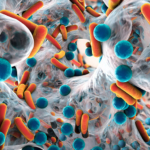Free intestine
Millions of packs of laxatives are consumed in Italy every year. These preparations offer a temporary solution to the problem, but aggravate it over time, creating addiction.
Intestinal transit disorders are not limited to constipation but include a plethora of other disorders, such as bloating, irritable bowel, intestinal dysbiosis. The disorders of the intestinal transit largely depend on eating habits, characterised by extremes both where excess and deficiencies are concerned: too many carbohydrates, too much fat and too much red meat, on the one hand; not enough fruit and vegetables and too little fibre, on the other.
Some medicinal plants, such as Psyllium and Ginger, combined with digestive enzymes, can help gently re-educate the intestine, promoting physiological intestinal transit.
Psyllium
Psyllium is a plant common to the Mediterranean area; we use its small black, flavourless, odourless seeds which contain a mucilage that swells and increases in volume upon contact with water. The gel thus generated in the intestine increases the volume of the faecal mass, softens it and stimulates peristalsis mechanically, facilitating defecation. The mucilage in psyllium, based on its soluble fibre content, also possesses pre-biotic properties stimulating the development of fermentative microflora in the colon, a characteristic that makes it very useful in cases of stypsis with intestinal dysbiosis.
Ginger
A herbaceous plant originating from the Far East, Ginger is a member of the Zingiberaceae family, alongside cardamom and turmeric. Its root absorbs summer heat, transforming it into the active principles of the essential oil. This essence gives us back part of the heat, helping to stimulate the stomach, counteracting digestive problems, the various forms of gastric atony, and bloating. The German naturalist and nun Hildegard of Bingen (1098-1179) observed: ‘Ginger is very hot and spreads easily. We must take ginger when we suffer from a heavy stomach or in case of constipation’. The raw material is comprised of the rhizome, which contains important active ingredients called gingerols and shogaols, the active ingredients that give it its tangy/tingly flavour. Ginger performs a prokinetic action that promotes intestinal transit.
Digestive enzymes
The activity of the specific enzyme pool helps improve the digestive processes, thereby reducing post-prandial heaviness. Reducing large molecules into smaller units makes it possible to limit the fermentation processes and, therefore, the formation of uncomfortable gas in the intestines, limiting intestinal bloating.

 Specchiasol
Specchiasol Specchiasol
Specchiasol



 Specchiasol
Specchiasol Specchiasol
Specchiasol